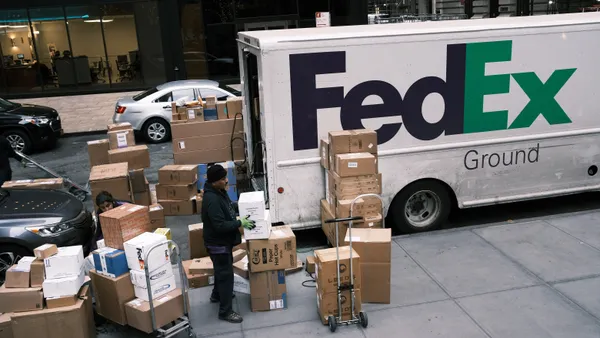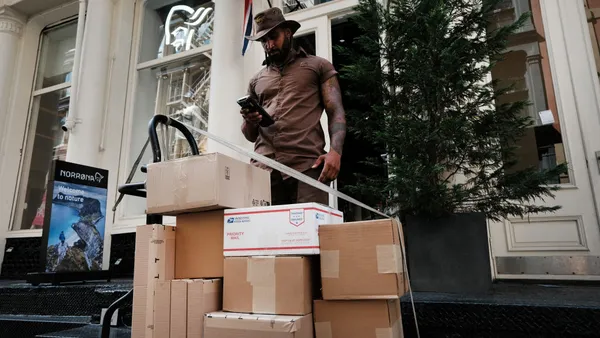The struggles of Pitney Bowes' former e-commerce logistics unit have been laid bare in its Chapter 11 bankruptcy process as operations wind down.
Court filings detail the years-long struggle of Global Ecommerce, or GEC, to become profitable and subsequent efforts by Pitney Bowes to offload the business. Despite handling millions of packages every month, servicing hundreds of brands and utilizing a network of 12 U.S. parcel sortation centers, the shipping provider never provided the necessary return for its parent company.
"Simply put, the GEC business is no longer profitable and has not been for some time," said Eric Kaup, chief restructuring officer of DRF Logistics – GEC's new name as it heads toward closing – in an Aug. 9 court filing.
That fundamental issue led Pitney Bowes to sell its majority interest in GEC to Hilco Global. The financial services firm will liquidate and close the business through the Chapter 11 process, which is slated to wrap up in early 2025. Several vendors, including UPS and Ambi Robotics, are seeking repayment through the process.
Here’s what led to GEC’s closing, according to Kaup’s account.
Profitability woes never faded
Pitney Bowes originally saw the GEC business as a way to jump into the growing e-commerce package delivery space while hedging against long-term mail volume declines, a threat to its mail processing business.
To build up the GEC segment, Pitney Bowes acquired cross-border services provider Borderfree in 2015 for $395 million. Two years later, it purchased delivery, returns and fulfillment provider Newgistics for about $471 million to expand into the domestic parcel delivery market.
But the potential upside of those acquisitions never materialized, Kaup said, despite Pitney Bowes' heavy investments to build out GEC's network infrastructure through the years. GEC reported consistent annual drops in earnings before income and taxes since the Newgistics acquisition in 2017.
Pitney Bowes Global Ecommerce losses mounted for years
Recent market trends further challenged GEC. The parcel delivery space has grappled with excess capacity, or a supply-demand imbalance, since the pandemic-fueled e-commerce boom cooled off and slowed volume growth.
Carriers have offered up shipping discounts in an attempt to cover fixed costs and fuel volume growth in a softer market. However, this lowered the amount of revenue GEC received per package and further strained profitability.
"These forces (among others) placed significant financial pressure on the GEC business," Kaup said.
GEC sale explored for months
Amid continued losses, last year Pitney Bowes launched a strategic review of the segment. As part of the review, the company sought out potential buyers.
On Pitney Bowes' behalf, J.P. Morgan contacted 30 potential purchasers starting in November 2023. Pitney Bowes executed non-disclosure agreements and shared confidential materials with 17 of those potential purchasers.
"This robust and comprehensive marketing process was undertaken over a period of more than eight months," according to an Aug. 15 disclosure statement.
The company ultimately didn't receive any binding bids for the GEC unit at a price it found acceptable, Kaup said. Pitney Bowes did manage to make some GEC-related sales beforehand, however. It sold the fulfillment portion of its business to Stord in July for $1.25 million. GEC also sold $500,000 worth of robotics equipment and chargers to healthcare company Medline the same month.
But without a buyer in place for the entire GEC unit, Pitney Bowes determined that a liquidation and wind-down of the business was the best path forward to maximize creditor recoveries, Kaup said.
GEC’s top 30 unsecured creditors, the majority of which are transportation vendors such as UPS, are seeking more than $24.7 million in payment, according to an Aug. 8 court filing.
Vendors seek payment from Pitney Bowes Global Ecommerce
UPS and several other creditors listed did not respond to requests for comment.













